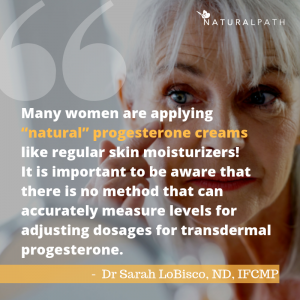 Hormonal harmony can seem like a fleeting hope for many women suffering with reproductive symptoms. Distressing ailments that wax and wane with changing hormonal fluctuations of their menstrual cycles is something that most females have accepted as “normal.”1-5 In fact, some may never get relief from their struggles. It can begin with one’s first period and continue through the last one and into post-menopausal years. 2,5
Hormonal harmony can seem like a fleeting hope for many women suffering with reproductive symptoms. Distressing ailments that wax and wane with changing hormonal fluctuations of their menstrual cycles is something that most females have accepted as “normal.”1-5 In fact, some may never get relief from their struggles. It can begin with one’s first period and continue through the last one and into post-menopausal years. 2,5
Why a personalized approach to treating hormonal imbalances is now accepted as most evidence-based
Although the most common standard of care treatment for alleviation of these discomforts is by providing synthetic hormones (oral contraceptives or hormone replacement therapy, HRT), the studies on efficacy are conflicting and not without associated risks.1-5 Evidence of this was made clear with the release of data from the Women’s Health Initiative (WHI) study. The results linked HRT to an increased risk for breast cancer and stroke.2-4 Though caveats have been found in this and other epidemiological studies, it is evident that a personalized approach to treating hormonal imbalances is now accepted as most evidence-based.2,4
An individualized approach is where naturopathic and functional medicine shines
Due to the debates among experts, inconsistent prescribing patterns, and conflicting study results, many women are often confused on who to trust and whether to use hormones at all, traditional or bioidentical. Others desire to find safe, natural alternatives to both, but don’t know where to start. This individualized approach is where naturopathic and functional medicine shine.
Recently, I just completed a series of articles on essential oils, hormones, and their impact on reproductive health. They are one of my favorite tools to use in my practice with women experiencing hormonal havoc; however, there is much more to achieving balance than one intervention after years of imbalances. I touched upon this topic more in one of my previous blogs, “Five Key Points for Balancing Hormones and Other Body Systems with Essential Oils and Integrative Medicine.”
In this article series, I will go deeper into what all women should consider when balancing hormones, especially those contemplating a form of hormone replacement, or already on it.
3 Considerations Every Women Should Consider When Balancing Hormones
Avoid Treating Test Results Alone: Understanding About the Caveats and Pitfalls with Lab Evaluation of Hormones
In a past article, I pointed out why it is important to consider the caveats of hormonal testing and the pitfalls of relying solely on lab results to assess treatment. This is especially true with ONLY using one test method of evaluation, whether it be serum, saliva, or urine. I wrote:
For example, women can have genetic differences in how their body breaks down and assimilates hormones, including [“natural” hormones found in] topical creams. These [variances] are termed single nucleotide polymorphisms (SNPs) and testing for these can provide information on how women will metabolize hormonal therapy, which can affect outcomes.6-8
Other factors in hormonal assessment include the capacity of the liver to break them down, tissue reserve, fat storage, and variations in enzyme pathways that synthesize them. Furthermore, nutrient deficiencies, stress, genetic predispositions, and lifestyle patterns all influence hormones.
This link of the steroid pathways9 will give a visual idea of the complexity of hormonal production and metabolism. It provides examples of what lifestyle measures, nutritional interventions, medications, and other factors interferes with and supports this process.9 It also highlights what is affecting the ability to produce, transport, assimilate, and detoxify hormones, and how different hormones interact.
You don’t need to understand the nitty gritty, but just a quick glance will tell you why relying on one lab that measures only one or a few of many hormones can be very shortsighted.
If a physician and patient do not understand these factors and the shortcomings of various testing methods, they may be using inappropriate guidance for determining dosages of hormones and not addressing the root cause of her symptoms.
The Importance of Considering and Including Metabolites of Hormones
Although not easily accessible in my state of New York, I have great respect for the Dried Urine Test for Comprehensive Hormones (DUTCH).9-10 DUTCH provides a detail measurement of hormonal metabolism and allows for an assessment of many of the factors not available in saliva and serum measurements.
This guide,10 provided by this lab, displays the benefits and shortcomings of different types of testing (serum, saliva, and urine) for the various forms of hormonal replacement (oral, transdermal, pellets, patches, injections, and sublingual). For example, it indicates that monitoring oral levels of progesterone in saliva and serum are often inaccurate due to quick fluctuations in levels.10-13 DUTCH can be used with this method to assess metabolites for personalizing dosages for sleep.10
Many women are applying “natural” progesterone creams like regular skin moisturizers! It is important to be aware that there is no method that can accurately measure levels for adjusting dosages for transdermal progesterone.10-13
I strongly urge every woman on any form of hormonal replacement to use this guide and provide it to their physician when they are monitoring their hormones. In this way, you will both be more aware of what the results are measuring and if metabolites should be considered.
This article14 is an excellent explanation in lay terms of DUTCH, its benefits, and its caveats. It provides 3 clinical examples of its use: depression from sluggish cortisol clearance, “adrenal fatigue,” inflammation and blocking DHEA. Here is an excerpt:
Patient Case No. 1: Depression from Sluggish Clearance of Cortisol
To help you better understand the testing process, Mark shares a few specific cases to illustrate the advantages of the DUTCH system.
“Let’s take a particular example of someone who struggled with depression, and anxiety. We tested her cortisol. What do we find? Her results are high. We say, ‘AHA! We’ve got something here.’ The free cortisol is elevated. We know there’s more depression in people who have elevated free cortisol, so we draw this conclusion and we say, ‘You are ‘making too much cortisol.” But then we look downstream at those metabolites, we notice they’re actually low.
We say, ‘Hold on, what’s going on here is you have high free cortisol but the reason for that may be largely because you have sluggish clearance of this cortisol. You make it but you’re not getting rid of it.’ The liver’s not processing it properly to get rid of that cortisol, so the free cortisol is high.
But it’s not because your adrenal glands are pumping out lots of cortisol. In fact, they’re not pumping out that much cortisol at all. That specific pattern can happen when your thyroid is low. For a patient like that, as she deals with her thyroid issue there’s going to be a response on the cortisol side.
What we can do incorrectly is we can go chase that high cortisol and give people phosphatidylserine and all of these things to lower the adrenal output of cortisol. But that’s not her issue. Her issue is more nuanced and complex. When we look at all three dimensions of the cortisol, we get a fuller understanding.”14
When a woman I am working with cannot obtain a DUTCH test, or money is a factor, we can usually glean some information on her ability to metabolize hormones from a genetic test with a detoxification panel of clinically relevant SNPs.6-8 Along with her symptoms, clinical features, and/or additional labs, this can help me determine if her ability to breakdown hormones needs more lifestyle or nutritional support.
If physicians do not consider hormone metabolism, they may be overtreating, undertreating, inappropriately treating, and/or making women become dependent on HRT unnecessarily because underlying factors and the true cause is not being addressed.
In the conclusion of this article, I will dig into the third consideration for getting to the root of hormonal problems. I will provide an example of how I, as a naturopathic doctor and functional medicine practitioner, would address reproductive woes.
In the meantime, if you’d like to learn more about naturopathic and functional medicine and my methods of working with clients, click here.
References:
- Fishman JR, Flatt MA, Settersten RA. Bioidentical Hormones, Menopausal Women, and the Lure of the “Natural” in U.S. Anti-Aging Medicine. Social science & medicine (1982). 2015;132:79-87. doi:10.1016/j.socscimed.2015.02.027.
- Martin K, Barbieri R. Treatment of menopausal symptoms with hormone therapy. UptoDate. 2018. Available at: https://www.uptodate.com/contents/treatment-of-menopausal-symptoms-with-hormone-therapy. Accessed September 10, 2018.
- The NAMS 2017 Hormone Therapy Position Statement Advisory Panel. The 2017 hormone therapy position statement of The North American Menopause Society. Menopause 2017; 24:728.
- Barnabei VM, Cochrane BB, Aragaki AK, et al. Menopausal symptoms and treatment-related effects of estrogen and progestin in the Women’s Health Initiative. Obstet Gynecol 2005; 105:1063.
- Moreno, M. Premenstrual Syndrome Treatment & Management. EMedicine. Medscape. September 01, 2016. Available at: https://emedicine.medscape.com/article/953696-treatment. Accessed September 11, 2018.
- Hodges RE, Minich DM. Modulation of Metabolic Detoxification Pathways Using Foods and Food-Derived Components: A Scientific Review with Clinical Application. Journal of Nutrition and Metabolism. 2015;2015:760689. doi:10.1155/2015/760689.
- Trabert B, Schwartz SM, Peters U, et al. Genetic variation in the sex hormone metabolic pathway and endometriosis risk: an evaluation of candidate genes. Fertility and sterility. 2011;96(6):1401-1406.e3. doi:10.1016/j.fertnstert.2011.09.004
- Aschebrook-Kilfoy B, Neta G, Brenner AV, et al. Common genetic variants in metabolism and detoxification pathways and the risk of papillary thyroid cancer. Endocrine-Related Cancer. 2012;19(3):333-344. doi:10.1530/ERC-11-0372.
- Dutchtest.com. Steroid Pathway. Provider Resources: Product Information Sheets. Available at: https://dutchtest.com/wp-content/uploads/2017/10/Streroid-Pathways.pdf. Accessed September 10, 2018.
- Dutchtest.com. Testing Matrix. Provider Resources: Product Information Sheets. Available at: https://dutchtest.com/wp-content/uploads/2016/02/Testing-Matrix-1.pdf. Accessed September 11, 2018.
- Ottoson UB, Carlstrom K, Damber JE, von Schoultz B. Serum levels of progesterone and some of its metabolites including deoxycorticosterone after oral and parenteral administration.Br J Obstet Gynaecol. 1984 Nov;91(11):1111-9.
- Tavaniotou A, Smitz J, Bourgain C, Devroey P. Comparison between different routes of progesterone administration as luteal phase support in infertility treatments. Human Reproduction Update. 2000; 6(2): 139–148. http://hormonebalance.org/images/documents/Tavaniotou%2000%20Vag%20prog%20sup%20to%20oral%20LPS%20HR.pdf
- Zargar-Shoshtari S, Wahhabaghei H, Mehrsai A, Wen J, Alany R Transdermal delivery of bioidentical progesterone using dutasteride (A 5α-reductase inhibitor): a pilot study.J Pharm Pharm Sci. 2010;13(4):626-36. https://journals.library.ualberta.ca/jpps/index.php/jpps/article/viewFile/9065/7650
- Mercola J. DUTCH — The Most Informative Hormone Test Out There. Mercola.com. May 8, 2016. Available at: https://articles.mercola.com/sites/articles/archive/2016/05/08/dutch-hormone-test.aspx. Accessed September 11, 2018.
Photo by Jen Loong on Unsplash
 Sarah LoBisco, ND, IFCMP, is a graduate of the University of Bridgeport’s College of Naturopathic Medicine (UBCNM). She is licensed in Vermont as a naturopathic doctor and has received her certification in functional medicine through the Institute of Functional Medicine (IFM), which is accredited by the Accreditation Council for Continuing Medical Education (ACCME). She holds a Bachelor of Psychology from State University of New York at Geneseo and is also certified in Applied Kinesiology. Dr. LoBisco currently incorporates her training in holistic and conventional medicine through writing, researching, and through her independent consulting work with individuals and for companies regarding supplements, nutraceuticals, essential oils, and medical foods. Dr. LoBisco speaks professionally on integrative medical topics and has several journal publications. “Dr. Sarah” also enjoys continuing to educate and empower her readers and clients through her blogs and social media. Her main blog can be found at dr-lobisco.com.
Sarah LoBisco, ND, IFCMP, is a graduate of the University of Bridgeport’s College of Naturopathic Medicine (UBCNM). She is licensed in Vermont as a naturopathic doctor and has received her certification in functional medicine through the Institute of Functional Medicine (IFM), which is accredited by the Accreditation Council for Continuing Medical Education (ACCME). She holds a Bachelor of Psychology from State University of New York at Geneseo and is also certified in Applied Kinesiology. Dr. LoBisco currently incorporates her training in holistic and conventional medicine through writing, researching, and through her independent consulting work with individuals and for companies regarding supplements, nutraceuticals, essential oils, and medical foods. Dr. LoBisco speaks professionally on integrative medical topics and has several journal publications. “Dr. Sarah” also enjoys continuing to educate and empower her readers and clients through her blogs and social media. Her main blog can be found at dr-lobisco.com.

















